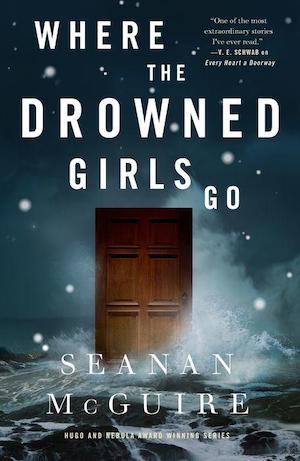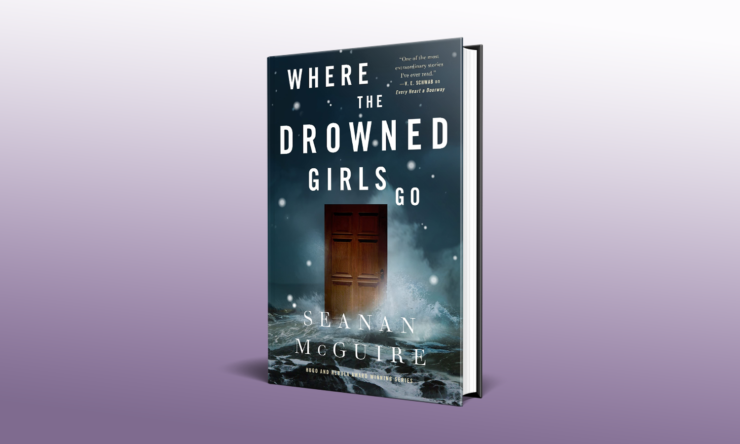Where the Drowned Girls Go is slightly different from some of the other installments in Seanan McGuire’s Wayward Children series. Unlike most of the six novellas before it, we spend little time in the magical worlds found behind the children’s doors. That doesn’t mean, however, that Where the Drowned Girls Go doesn’t expand the Wayward Children universe. For the series as a whole, it opens the door (pun intended, sorry) to what’s going on in the children’s original world while also exploring themes of self-acceptance, and how sometimes people who want to help you will actually cause you harm.
In this story, we follow Cora, a girl who found her door to the Trenches after she tried to kill herself, beat down by the fatphobic comments thrown at her her whole life. In the Trenches, she becomes a mermaid and hero, though when she finds herself thrown back into her original world she’s back on two feet, albeit with blue hair. Cora, like most of the children at Miss Eleanor’s Home for Wayward Children, wants to go back to her magical world. Before she finds her door again, however, she has other adventures in the Moors, a magical world where there are Drowned Gods who want to claim her.
Buy the Book


Where the Drowned Girls Go
Cora wants to forget the Drowned Gods, and for the Drowned Gods to forget her. She’s so desperate to be rid of them that she asks to be transferred to a different school, the Whitethorn Institute, a place that also takes in children who found their doors and then found themselves back in their original world. Unlike Miss Eleanor’s school, however, Whitethorn seems similar to our own world’s abusive practice of “conversion therapy” that some LGBTQ+ people, often children, are still sent to.
“The people here think they’re helping us,” a character says at one point about the Institute. “They think they’re heroes and we’re monsters, and because they believe it all the way down to the base of them, they can do almost anything and feel like they’re doing the right thing.”
The Whitethorn Institute metaphorically beats the magic out of their students, and at first Cora is dedicated to the practice—she wants her blue hair and the rainbow scales on her skin to fade away if it makes the Drowned Gods leave her be.
Ultimately, however, there’s more to the school than these cruel practices Cora is introduced to, and as the school’s insidious nature becomes all-too apparent, Cora is helped by old friends and new as they all try to escape the Institute. Those old friends are characters we’ve spent time with from other books in the series, though you don’t have to have read the other Wayward Children books to enjoy and follow this tale. (Having read Come Tumbling Down, Beneath the Sugar Sky, and Across the Green Grass Fields, however, would give you more background on certain characters).
Throughout their struggle to leave the institute, Cora also comes into self-acceptance and finds strength within herself. She is a hero, no matter what the Drowned Gods want or what Whitethorn Institute wants to shape her into. Where the Drowned Girls Go is another wonderful addition to the series—one that gives Cora her due and opens up potential storylines that will likely find their way into future Wayward Children books.
Where the Drowned Girls Go is available from Tordotcom Publishing.
Vanessa Armstrong is a writer with bylines at The LA Times, SYFY WIRE, StarTrek.com and other publications. She lives in Los Angeles with her dog Penny and her husband Jon, and she loves books more than most things. You can find more of her work on her website or follow her on Twitter @vfarmstrong.










